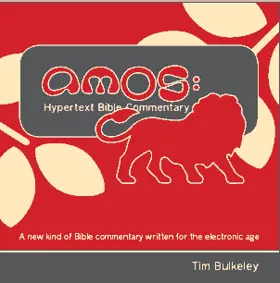

Amos: Hypertext Bible Commentary
Publisher
Hypertext Bible, Auckland
Published
1/1/2005
ISBN-13
9780473107147
An online Bible commentary available at http://www.hypertextbible.org/amos/
Reviews
CD-ROM; online at http://hypertextbible.org/amos/. ISBN 0473107147. Ehud Ben Zvi University of Alberta Edmonton, Alberta, Canada This is the first volume in a new series, the Hypertext Bible Commentary. The series as per its name uses new electronic technologies, online delivery, and particularly hypertextual capabilities to enrich the traditional genre of biblical commentary. The author of this volume has been at the helm of this project and its twin one of developing an online, free biblical encyclopedia, a kind of peer-reviewed Wikipedia (for information on both projects, see http://bible.gen.nz/). Both projects are aimed at the wide, general public that more and more searches for information online. As such, provided that their contents are appropriate, these and similar projects will play a significant, and likely ever-increasing role in the education of the general public on biblical matters. Certainly these are not light matters. What do readers of this commentary encounter when they turn to it? Many are variants of the same features found in more traditional commentaries. For instance, they find a Hebrew text of Amos and an English translation. The difference is that almost every word in the Hebrew text carries a hyperlink to annotations. For instance, the only word that is not hyperlinked in Amos 1:1 is l(. But are these annotations always helpful or even anecessary? For instance, clicking on l)'rF#&;y I in 1:1 brings the following text: yisra'el Israel. Name of both a people and a state. Jacob, the patriarch was remaned [sic] “Israel” after his fight at the Jabbok, and the nation which claims descent from his children are called “Children of Israel” or “Israel”. With the separation of the two kingdoms the northern state was called “Israel” and the southern one “Judah’.
[Full Review]
